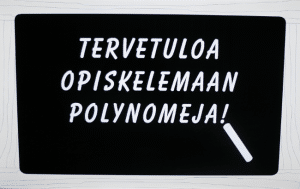Games Can Help You Learn

Welcome to study polynomials, says Polly Polynomial.
I had my first experience with gamified education during my study time. As a practical course work, we compiled a game for math teaching together with my classmate. In the game a parrot named Polly taught the players polynomials. Simple and changing tasks intensified learning and the game ended in a brief test. If the player was skillful, the tasks became more and more challenging. I’ve used the game later in real-life teaching when I was working as a math teacher in elementary school.
Adults taking part in children’s lives should familiarize themselves better with the world of games and the content Internet has to offer. My godson visited us this winter and we heard that he still hadn’t learned the names of the months. One morning we dug up a simple gamified application from the Internet that helped him to memorize the months. Provably he remembered the months next morning! The same godson and my partner’s goddaughter have also studied programming with the help of Angry Birds, Mark Zuckerberg and Bill Gates. During the Hour of Code they learned the basics of programming in a fun way through play and trial. At the same time their English language skills improved.
There are plenty of international examples of how games and game-like elements can be used in education. Two educational games I remember exceptionally well: Duolingo and the World Peace Game. In Duolingo, anyone can learn new languages by translating sentences picked from different webpages. The service is free of charge and you can really feel that you’re learning something meaningful, because the translated sentences are taken from existing webpages. The World Peace Game, in turn, is a huge board game developed by an American teacher John Hunter. The game teaches student groups to live and work together and solve problems in the world. Unfortunately the board game can’t be bought anywhere yet, but there might be a virtual version in the making.
The amount of educational games is huge nowadays. There are little Java applets, many school book series include DVDs and many others. When I was teaching in the elementary school, I for example used platform games to teach mathematics. Yet, I don’t see that these kinds of entertaining educational games could be of much use in the hectic working life. You don’t have much time to play during a busy working day, so learning should be easy, fast and efficient, but you shouldn’t forget the fun. However, game elements can be used in workplace to intensify learning experience in training and coaching. What would you think about a board game designed for strategy implementation? Or about a virtual learning environment that guides the learner and gives instant feedback? Even incidental exercise can be gamified: a Finnish training and consulting company Tieturi (article available only in Finnish) encourages employees to use stairs instead of the elevator by using a simple yet effective game.
How can you use games and gamification in your workplace? Share your thoughts below!
